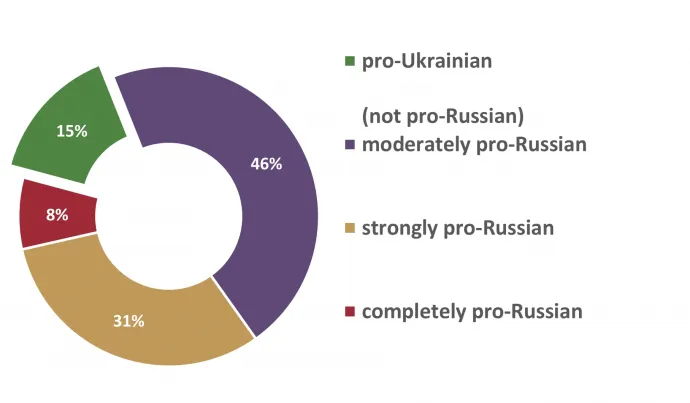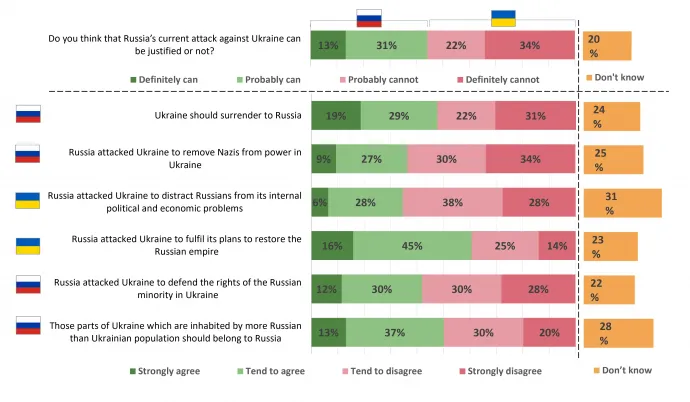According to a recent survey, almost half of Hungarian internet users may be moderately pro-Russian
Nearly half (46%) of Hungarian internet users are moderately pro-Russian, while a further third (31%) are strongly pro-Russian, according to the survey conducted by Kantar International.
The survey, commissioned by the Prague-based Free Press Eastern Europe, looked at opinions on the war in Ukraine in six Central European countries (Bulgaria, the Czech Republic, Poland, Romania, Slovakia and Hungary).
The survey was carried out between 28 June and 7 July of this year, with the participation of 1,000 people using an online questionnaire. The respondents were aged between 18 and 65. The percentage of internet users in the adult population aged 18 and over in the first quarter of 2022 was 77%, which, assuming an adult population of roughly 8 million, is approximately 6.2 million people.
The results reveal that the proportion of those who support the Ukrainian position is much lower in Hungary than the proportion of those who – to some extent- agree with the Russian position.
Update on 23.09.
The survey presented seven pro-Russian or pro-Ukrainian narratives to the respondents who were then – based on their answers – categorised as pro-Ukrainian, moderately pro-Russian, strongly pro-Russian or completely pro-Russian.
However, respondents who answered 'don't know' to more than 3 out of 7 questions were not included in the grouping. A very high proportion (between 20% and 31%) of respondents were unable or unwilling to express an opinion on some questions, so the conclusion may be somewhat skewed.
46% of Hungarian Internet users were moderately pro-Russian, 31% strongly pro-Russian, 8% completely pro-Russian and only 15% pro-Ukrainian.

The proportion of those who support the Ukrainian position is higher among those with higher education and living in bigger cities, while the proportion of men in the fully pro-Russian group is above average, and the proportion of those living in villages is higher and the proportion of those living in bigger urban centres is lower. The adoption of the pro-Russian narrative is accompanied by a decrease in the proportion of those who (also) use English language news sources and an increase in the proportion of people who have access to Russian-language sources.
The results show that there is essentially no statement that Hungarian respondents clearly agree or disagree with. "This indicates the ongoing struggle for a dominant public narrative and the extent to which Hungarian society has become polarised as a result of this" the research details. The proportion of those who were unable or unwilling to express an opinion on each issue is also very high (between 20% and 31%).

The opinions of the pro-Russian and the pro-Ukrainian respondents also differ widely on the specific consequences of the war.
Those who accept the pro-Russian narrative are not in favour of severing economic ties with Russia and providing military and financial aid to Ukraine, and are considerably less supportive of Hungary's active involvement in Ukraine's post-war reconstruction.
Only 15% of the moderately pro-Russian respondents consider it unthinkable that Russia would attack Hungary after the eventual defeat of Ukraine, compared to 54% of strongly pro-Russian respondents and 72% of fully pro-Russian respondents.
Around a quarter of Hungarian internet users also agree to some extent with the statement that Hungary may formulate a claim to some territories in Western Ukraine.
However, the majority (85%) of those who support the Ukrainian position in the war, strongly reject this claim.
For more quick, accurate, and impartial news from and about Hungary, subscribe to the Telex English newsletter!
The translation of this article was made possible by our cooperation with the Heinrich Böll Foundation.